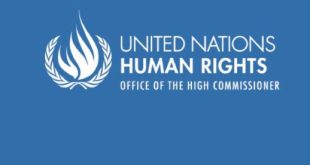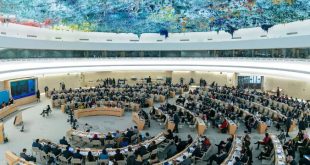When the going gets tough the weak get hammered. As the United States' military occupation of Afghanistan falters with the Taliban launching a series of successful attacks on US targets, many wonder whether President Barack Obama, in a deep quagmire over his failure to salvage the crumbling economy, is now planning a war on Pakistan or at least parts of Pakistan as his re-election strategy.
Yesterday, the Pakistani government convened an all-party conference to evolve a national response to the threat of a possible US war. Never since Pakistan joined the US war on terror, has it resorted to such a mechanism. Such is the fear that has gripped Pakistan's government in spite being a US ally.
Since the Afghan war began, many Pakistanis have been living with the fear that the US has come to their neighbourhood with the intention of taking control of their nuclear weapons.
The fear only grows each time a US official blames Pakistan for not doing enough in the so-called war on terror or accuses its intelligence agency, the Inter-Service Intelligence, of having links with the very terrorists the US is fighting in Afghanistan.
The latest accusation came from outgoing US Chairman of the Joint Chiefs of Staff, Mike Mullen, last week. In what many Pakistanis describe as preposterous and ungrateful comments, Mullen charged that the Haqqani group, a pro-Taliban militant outfit operating in Afghanistan and from Pakistan's Federally Administered Tribal Areas, was a "veritable arm" of the ISI. Ungrateful, because Pakistan has sacrificed some 5,000 soldiers in the United States' fight against terror — more than the number of US soldiers killed in both Iraq and Afghanistan.
Mullen's comments, the biggest bombshell to hit the sometimes-tottering-and-sometimes-cordial US-Pakistani relations, were specific — the ISI aided the Haqqani group to launch a daring attack on the US embassy in Kabul on September 13, two days after the US at 9/11 ceremonies renewed its resolve to continue its war on terror.
Though similar charges have been made against Pakistan time and again since the war on terror began and Islamabad has dismissed such charges, Pakistani authorities, this time around, have apparently been highly perturbed because Mullen made the charge in his testimony to the Congress. He would not have made that statement without the administration's approval. There appears to be a building up of a case for invasion and probably the Mullen statement was a prelude to it.
.jpg)
The charge prompted Pakistan's Foreign Minister Hina Rabbani Khar to warn the US that it would lose an ally while the country's Army Chief Ashfaq Kayani met his top generals in an emergency meeting to discuss the security threat.
Ten years ago, General Kayani's predecessor and military ruler Pervez Musharraf had a similar meeting in the face of serious threats from the US. After the then US Assistant Secretary of State Richard Armitage warned that Pakistan would be bombed back to the Stone Age, Musharraf war-gamed the consequences if Pakistan was to defy the US. Musharraf's decision to join the war on terror cost Pakistan immensely in terms of economic and human losses. True, the Americans have pumped more than US$ 15 billion into Pakistan, but the losses far outweigh the gains. According to some estimates, Pakistan's economy has suffered more than US$ 60 billion in losses as a direct result of Musharraf's decision to join the imperialists' war, though he justifies the decision as the best he could have taken to save his motherland.
He is right, even today, the choice before Pakistan is not between what is good or what is bad for the country, but what is the least harmful among the many options. Whatever option it picks, it suffers.
With Pakistan giving the nod for the Americans not only to use its airbases for attacks on Taliban targets in Afghanistan but also to kill its own people who had little to do with the 9/11 terrorists, the country has been turned into a hell hole of terrorism, bomb blasts, suicide attacks, corruption, betrayal and treason.
When the citizens saw the doom, government leaders resorted to a double game — talking rhetoric in public while behind-the-scene, succumbing to American bullying. The people heard government leaders thundering that Pakistan's sovereignty was not for sale and that they would not allow the country's airspace to be violated.
But when such violations became more frequent, not only the complicity of the rulers but also the sale of Pakistan's sovereignty to the US became obvious to the people
The Raymond Davis case was a classic example. Davis, a CIA operative who killed two Pakistani youths in February this year, got away after millions of dollars changed hands.
Then in May this year, the Pakistani people were humiliated in yet another violation of their sovereignty when the elite US special forces carried out a daring raid on al-Qaeda leader Osama Bin Laden's hideout, just 60 kilometres away from the capital Islamabad. Again the Asif Ali Zardari and Yousuf Raza Gilani government tried to assure the Pakistani people saying that the US had been sternly warned not to repeat it. But not many Pakistanis believe them now.
Even after the Abottabad raid, US drone attacks continue. Some estimates say more than 30,000 Pakistani civilians have been killed in drone attacks and violence associated with the US war on terror — ten time the number of people killed in the 9/11 attacks.
Under the circumstances, Pakistan has been asked to do more and start a war against its own people in the tribal areas in a bid to eliminate the Haqqani group, led by Jalaluddin Haqqani, a legendary tribal leader who rose to fame after his many victories against the Soviet occupation forces in the Afghan war of 1980s.
Killing or capturing Haqqani won't come without Pakistan alienating a large majority of its own population in FATA. Two years ago, Pakistan launched a war in Waziristan with disastrous results. But Pakistan's dilemma is that if it does not do it, the US will.
source – dailymirror
 Sri lanka Muslims Web Portal Diversity and Inclusiveness
Sri lanka Muslims Web Portal Diversity and Inclusiveness



